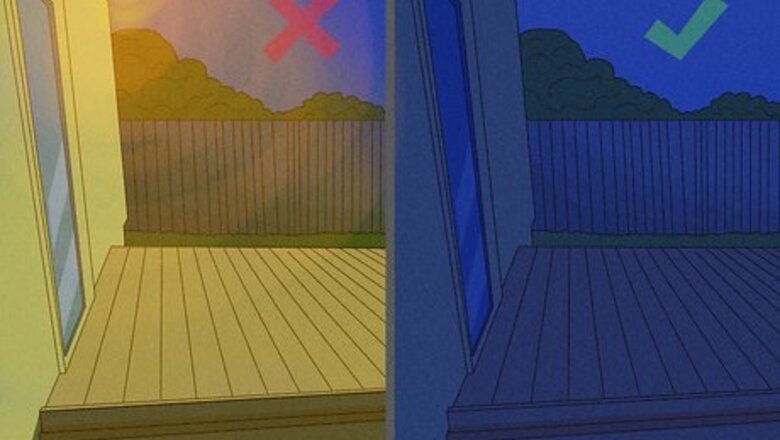
views
- Shut off outdoor lights so you don’t attract insects, the main food source for frogs.
- Put a pool cover over the water to keep the frogs out. If you can’t cover it, keep your pump running and heat the water to deter them.
- Spread coffee grounds, citric acid, or vinegar around your pool since it will irritate any frogs that touch it.
- Clean your pool and keep your yard tidy so frogs are less likely to visit your pool. Alternatively, build a frog pond that’s more attractive to frogs.
Turn off outdoor lights.
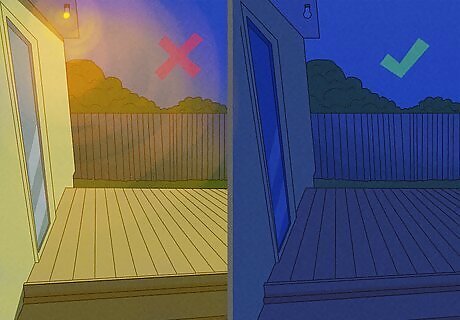
Bright lights attract insects that the frogs feed on. Once it gets dark outside, turn out the lights around your pool to keep the bugs away. Since the frogs won’t have any food, they’ll find somewhere else to call home instead of your pool. If you want to leave your exterior lights on, switch to sodium vapor bulbs since they attract fewer insects.
Run your pool pump.
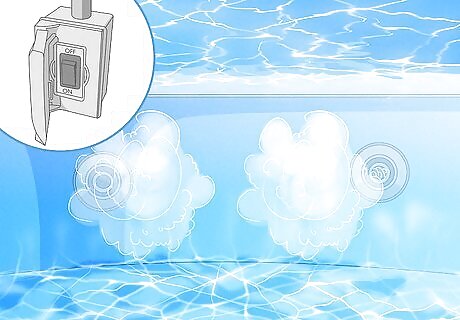
Moving water deters frogs from settling in your pool. Frogs don’t like to hang around when your pool water is constantly circulating. Keep your pump running even when you’re not actively swimming in your pool so the water doesn’t grow stagnant. Circulating water also helps prevent algae from growing in the water. Consider installing a water feature, like a fountain or waterfall, in an in-ground pool to help keep the water flowing even more.
Cover your pool.
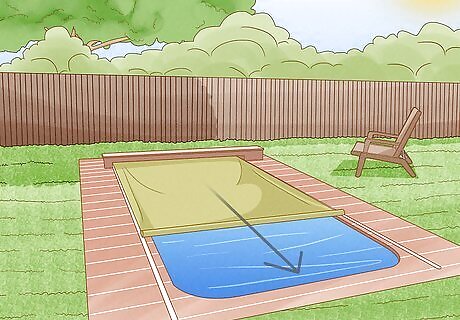
A pool cover stops frogs from getting in the water. Use a cover that’s large enough to extend past the edges of your pool so frogs can’t get in. Whenever you’re not swimming, stretch the cover tightly over your pool to keep animals and other debris out. Pool covers also prevent your pool water from evaporating so you don’t have to refill it.
Heat your pool water.
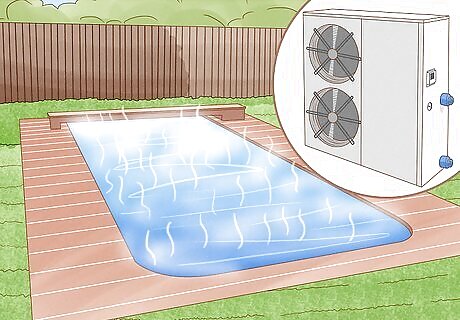
Frogs will seek out colder water to soak in. If you already have a heater for your pool, leave it running to maintain a higher water temperature. To avoid any costly heating bills, warm up your pool by putting on a solar cover during the day, floating solar rings in the water, or pouring liquid solar cover onto the surface. Colder water provides more oxygen to frogs than warmer water, so they’ll look for someplace else to cool down.
Sprinkle used coffee grounds around your pool.

Frogs will avoid stepping on the acidic coffee grounds. Once you finish brewing your coffee, take out the grounds and line them around the perimeter of your pool. Since the frogs won’t like the feeling of the grounds on their sensitive skin, they’ll turn away and find somewhere else to call home. Coffee grounds also lower the pH of your soil so it can really benefit plants that require acidic growing conditions.
Spray citric acid around your pool.

The acidic solution will irritate frogs when they touch it. Combine about ½ cup (125 g) of citric acid powder with 32 fluid ounces (950 ml) of water in a spray bottle. Coat the ground around your pool and any nearby foliage with the citric acid solution. After 2 weeks, reapply more of the citric acid if you still see frogs in your yard. Citric acid can burn sensitive plants, so rinse them off with clean water after 1 hour. The spray will still be effective if frogs come into contact with the plants. Wear long sleeves, pants, closed-toe shoes, gloves, and safety glasses when you use citric acid since it may irritate your skin. Alternatively, try mixing equal parts vinegar and water to spray it. Since the vinegar is also acidic, it may help deter frogs.
Clean and maintain your pool.
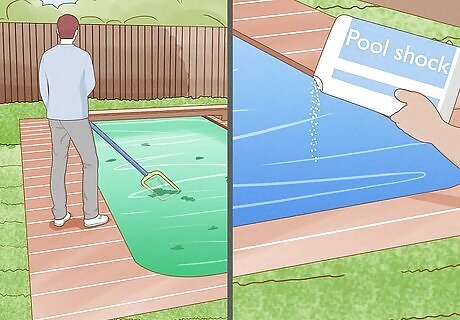
Frogs are more likely to stay in your pool if it’s dirty or has algae. Scoop out debris as soon as you can with a pool skimmer so it doesn’t build up in the water. Be sure to chlorinate your pool to help kill bacteria and keep your pool water sanitary. Maintain your pool’s chemistry so it has a pH around 7.5 Chlorine in your pool water makes frogs sick, so once they hop in, they’ll immediately want to get out so they don’t get hurt. Do shock treatments with chlorine once a week to kill all the bacteria in the water.
Get rid of tall grass and yard debris.

Clearing away hiding spots makes your yard less attractive to frogs. Get rid of any piles of debris, damp wood piles, or large shaded rocks where frogs can stay cool during the day. Be sure to mow your lawn and keep all of your plants trimmed back so frogs are less likely to hang around your pool. If you have a deck or porch, seal up any openings so frogs can’t get inside.
Install a fence around your pool.
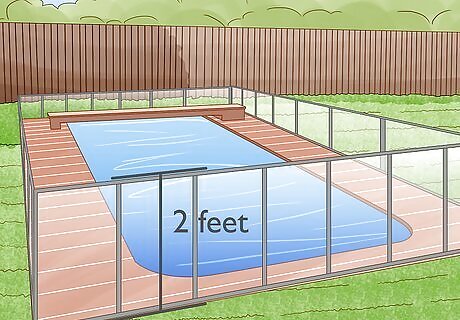
A physical barrier prevents frogs from reaching your pool water. Use a mesh fencing material made of metal or plastic with ⁄2 in (1.3 cm) holes. Run the fencing material around the perimeter of your pool so it’s at least 2 feet (61 cm) tall. That way, the frogs won’t be able to hop over it. If you want to get rid of frogs completely, fence in your entire yard instead.
Build a frog pond.
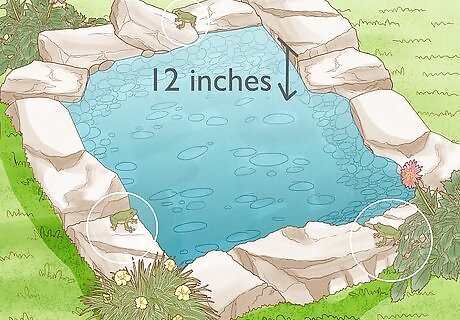
An alternative habitat for frogs will draw them away from your pool. Set up your frog pond in a quiet spot of your yard away from your pool. Provide shallow water with a really slow flow as well as spots that are deeper than 12 inches (30 cm). Add some native plants to the landscape along with some large rocks and logs for shelter. Avoid putting fish in your pond since they may eat frog eggs and tadpoles. If you want to make a frog habitat on a budget, then leave a bird bath on the ground or a small kiddie pool.
Scoop out frogs with a pool skimmer.

Frogs can’t jump out of your pool on their own. If a live frog is swimming in your pool, try to catch it with your net skimmer or a bucket. Once you get the frog out of the water, relocate it to a different area of your yard or another nearby body of water. If you find frog eggs or tadpoles underwater, catch them and place them in a bucket with clean water. Pour the eggs into a different body of water or contact local animal control to find out where to take them. Frogs breathe through their skin, so the chlorine in your pool water can make them get very sick.
Provide a ramp for frogs to get out.
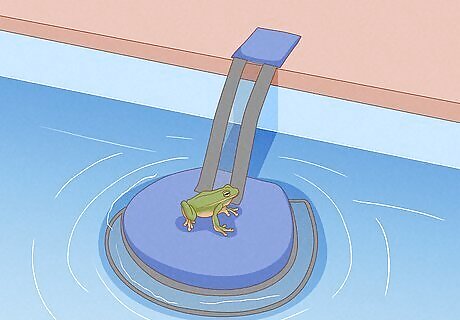
A ramp lets frogs escape your pool without getting stuck. Set a paddle board or a commercial frog ramp so the bottom half sits in the water and the top extends past the lip of your pool. That way, any frogs that accidentally get into your pool can climb out on their own. When frogs get in your pool water, they can’t jump back out. Since they have to keep swimming, they might die from exhaustion.















Comments
0 comment